英语四六级考试复合式听写部分点睛
- 格式:doc
- 大小:32.50 KB
- 文档页数:3
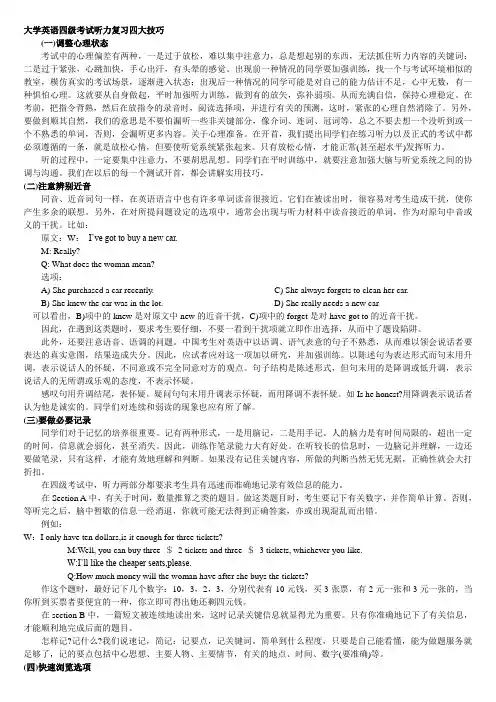
大学英语四级考试听力复习四大技巧(一)调整心理状态考试中的心理偏差有两种,一是过于放松,难以集中注意力,总是想起别的东西,无法抓住听力内容的关键词;二是过于紧张,心跳加快,手心出汗,有头晕的感觉。
出现前一种情况的同学要加强训练,找一个与考试环境相似的教室,模仿真实的考试场景,逐渐进入状态;出现后一种情况的同学可能是对自己的能力估计不足,心中无数,有一种惧怕心理。
这就要从自身做起,平时加强听力训练,做到有的放矢,弥补弱项。
从而充满自信,保持心理稳定。
在考前,把指令背熟,然后在放指令的录音时,阅读选择项,并进行有关的预测,这时,紧张的心理自然消除了。
另外,要做到顺其自然,我们的意思是不要怕漏听一些非关键部分,像介词、连词、冠词等,总之不要去想一个没听到或一个不熟悉的单词,否则,会漏听更多内容。
关于心理准备。
在开首,我们提出同学们在练习听力以及正式的考试中都必须遵循的一条,就是放松心情,但要使听觉系统紧张起来。
只有放松心情,才能正常(甚至超水平)发挥听力。
听的过程中,一定要集中注意力,不要胡思乱想。
同学们在平时训练中,就要注意加强大脑与听觉系统之间的协调与沟通。
我们在以后的每一个测试开首,都会讲解实用技巧,(二)注意辨别近音同音、近音词句一样,在英语语言中也有许多单词读音很接近。
它们在被读出时,很容易对考生造成干扰,使你产生多余的联想。
另外,在对所提问题设定的选项中,通常会出现与听力材料中读音接近的单词,作为对原句中音或义的干扰。
比如:原文:W:I’ve got to buy a new car.M: Really?Q: What does the woman mean?选项:A) She purchased a car recently.B) She knew the car was in the lot. C) She always forgets to clean her car.D) She really needs a new car可以看出,B)项中的knew是对原文中new的近音干扰,C)项中的forget是对have got to的近音干扰。
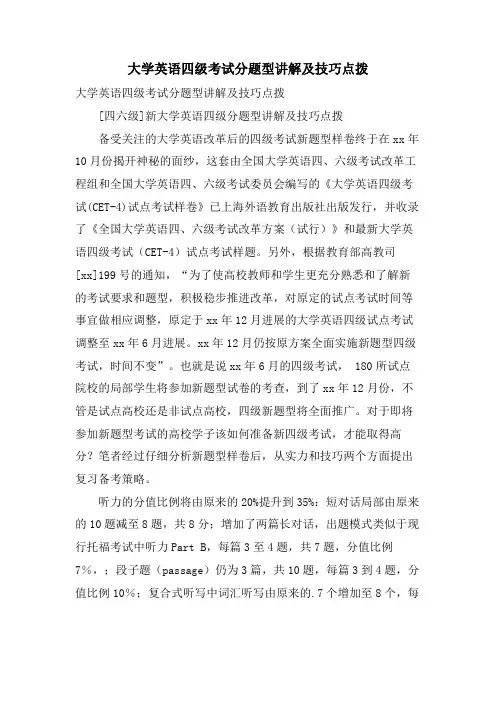
大学英语四级考试分题型讲解及技巧点拨大学英语四级考试分题型讲解及技巧点拨[四六级]新大学英语四级分题型讲解及技巧点拨备受关注的大学英语改革后的四级考试新题型样卷终于在xx年10月份揭开神秘的面纱,这套由全国大学英语四、六级考试改革工程组和全国大学英语四、六级考试委员会编写的《大学英语四级考试(CET-4)试点考试样卷》已上海外语教育出版社出版发行,并收录了《全国大学英语四、六级考试改革方案(试行)》和最新大学英语四级考试(CET-4)试点考试样题。
另外,根据教育部高教司[xx]199号的通知,“为了使高校教师和学生更充分熟悉和了解新的考试要求和题型,积极稳步推进改革,对原定的试点考试时间等事宜做相应调整,原定于xx年12月进展的大学英语四级试点考试调整至xx年6月进展。
xx年12月仍按原方案全面实施新题型四级考试,时间不变”。
也就是说xx年6月的四级考试, 180所试点院校的局部学生将参加新题型试卷的考查,到了xx年12月份,不管是试点高校还是非试点高校,四级新题型将全面推广。
对于即将参加新题型考试的高校学子该如何准备新四级考试,才能取得高分?笔者经过仔细分析新题型样卷后,从实力和技巧两个方面提出复习备考策略。
听力的分值比例将由原来的20%提升到35%:短对话局部由原来的10题减至8题,共8分;增加了两篇长对话,出题模式类似于现行托福考试中听力Part B,每篇3至4题,共7题,分值比例7%,;段子题(passage)仍为3篇,共10题,每篇3到4题,分值比例10%;复合式听写中词汇听写由原来的.7个增加至8个,每空0.5分,听写仍保持3句不变,每句2分,复合式听写局部总共10分。
1、语音:*了解英美音的差异;例schedule,neither等*掌握根本的辨音根底,听到熟悉的音能在上下文中迅速确定对应的单词,提高听力的敏感性。
例:present,pleasant。
*注意连读问题,重点掌握固定词组之间的连读,根据连读规那么,尝试由慢到快脱口而出,提高对连读的听觉认知能力。
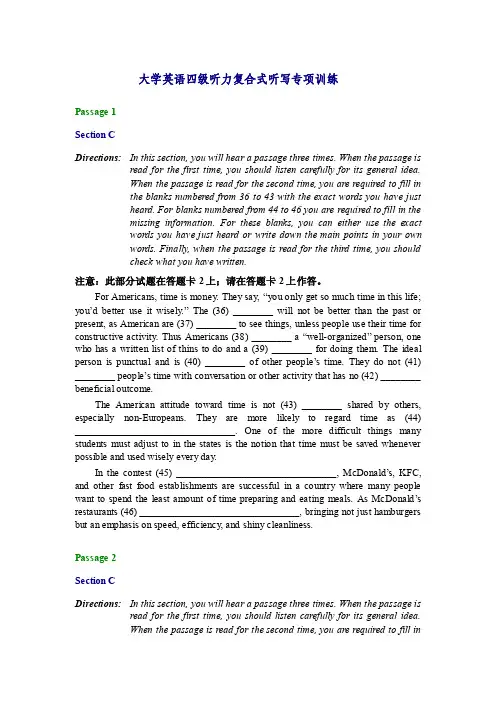
大学英语四级听力复合式听写专项训练Passage 1Section CDirections: In this section, you will hear a passage three times. When the passage is read for the first time, you should listen carefully for its general idea.When the passage is read for the second time, you are required to fill inthe blanks numbered from 36 to 43 with the exact words you have justheard. For blanks numbered from 44 to 46 you are required to fill in themissing information. For these blanks, you can either use the exactwords you have just heard or write down the main points in your ownwords. Finally, when the passage is read for the third time, you shouldcheck what you have written.注意:此部分试题在答题卡2上;请在答题卡2上作答。
For Americans, time is money. They say, ―you only get so much time in this life; you’d better use it wisely.‖ The (36) ________ wi ll not be better than the past or present, as American are (37) ________ to see things, unless people use their time for constructive activity. Thus Americans (38) ________ a ―well-organized‖ person, one who has a written list of thins to do and a (39) ________ for doing them. The ideal person is punctual and is (40) ________ of other people’s time. They do not (41) ________ people’s time with conversation or other activity that has no (42) ________ beneficial outcome.The American attitude toward time is not (43) ________ shared by others, especially non-Europeans. They are more likely to regard time as (44) ________________________________. One of the more difficult things many students must adjust to in the states is the notion that time must be saved whenever possible and used wisely every day.In the contest (45) ________________________________, McDonald’s, KFC, and other fast food establishments are successful in a country where many people want to spend the least amount of time preparing and eating meals. As McDonald’s restaurants (46) ________________________________, bringing not just hamburgers but an emphasis on speed, efficiency, and shiny cleanliness.Passage 2Section CDirections: In this section, you will hear a passage three times. When the passage is read for the first time, you should listen carefully for its general idea.When the passage is read for the second time, you are required to fill inthe blanks numbered from 36 to 43 with the exact words you have justheard. For blanks numbered from 44 to 46 you are required to fill in themissing information. For these blanks, you can either use the exactwords you have just heard or write down the main points in your ownwords. Finally, when the passage is read for the third time, you shouldcheck what you have written.注意:此部分试题在答题卡2上;请在答题卡2上作答。
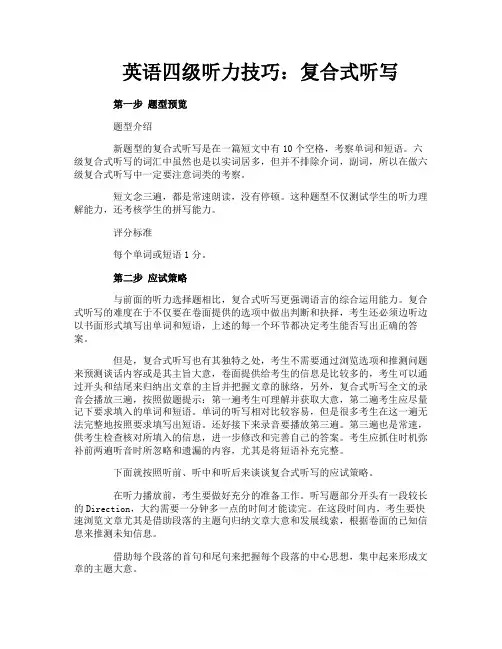
英语四级听力技巧:复合式听写第一步题型预览题型介绍新题型的复合式听写是在一篇短文中有10个空格,考察单词和短语。
六级复合式听写的词汇中虽然也是以实词居多,但并不排除介词,副词,所以在做六级复合式听写中一定要注意词类的考察。
短文念三遍,都是常速朗读,没有停顿。
这种题型不仅测试学生的听力理解能力,还考核学生的拼写能力。
评分标准每个单词或短语1分。
第二步应试策略与前面的听力选择题相比,复合式听写更强调语言的综合运用能力。
复合式听写的难度在于不仅要在卷面提供的选项中做出判断和抉择,考生还必须边听边以书面形式填写出单词和短语,上述的每一个环节都决定考生能否写出正确的答案。
但是,复合式听写也有其独特之处,考生不需要通过浏览选项和推测问题来预测谈话内容或是其主旨大意,卷面提供给考生的信息是比较多的,考生可以通过开头和结尾来归纳出文章的主旨并把握文章的脉络,另外,复合式听写全文的录音会播放三遍,按照做题提示:第一遍考生可理解并获取大意,第二遍考生应尽量记下要求填入的单词和短语。
单词的听写相对比较容易,但是很多考生在这一遍无法完整地按照要求填写出短语。
还好接下来录音要播放第三遍。
第三遍也是常速,供考生检查核对所填入的信息,进一步修改和完善自己的答案。
考生应抓住时机弥补前两遍听音时所忽略和遗漏的内容,尤其是将短语补充完整。
下面就按照听前、听中和听后来谈谈复合式听写的应试策略。
在听力播放前,考生要做好充分的准备工作。
听写题部分开头有一段较长的Direction,大约需要一分钟多一点的时间才能读完。
在这段时间内,考生要快速浏览文章尤其是借助段落的主题句归纳文章大意和发展线索,根据卷面的已知信息来推测未知信息。
借助每个段落的首句和尾句来把握每个段落的中心思想,集中起来形成文章的主题大意。
通过空格前后的上下文内容来推断听写单词的意思,通过句子结构的分析从语法角度判断听写单词的词性,如是名词要推断其实可数名词还是不可数名词;如是动词,要推断动词的时态和语态。
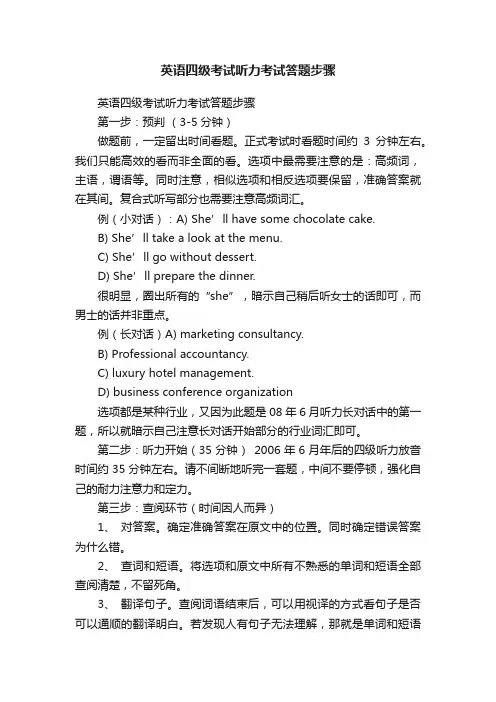
英语四级考试听力考试答题步骤英语四级考试听力考试答题步骤第一步:预判(3-5分钟)做题前,一定留出时间看题。
正式考试时看题时间约3分钟左右。
我们只能高效的看而非全面的看。
选项中最需要注意的是:高频词,主语,谓语等。
同时注意,相似选项和相反选项要保留,准确答案就在其间。
复合式听写部分也需要注意高频词汇。
例(小对话):A) She’ll have some chocolate cake.B) She’ll take a look at the menu.C) She’ll go without dessert.D) She’ll prepare the dinner.很明显,圈出所有的“she”,暗示自己稍后听女士的话即可,而男士的话并非重点。
例(长对话)A) marketing consultancy.B) Professional accountancy.C) luxury hotel management.D) business conference organization选项都是某种行业,又因为此题是08年6月听力长对话中的第一题,所以就暗示自己注意长对话开始部分的行业词汇即可。
第二步:听力开始(35分钟)2006年6月年后的四级听力放音时间约35分钟左右。
请不间断地听完一套题,中间不要停顿,强化自己的耐力注意力和定力。
第三步:查阅环节(时间因人而异)1、对答案。
确定准确答案在原文中的位置。
同时确定错误答案为什么错。
2、查词和短语。
将选项和原文中所有不熟悉的单词和短语全部查阅清楚,不留死角。
3、翻译句子。
查阅词语结束后,可以用视译的方式看句子是否可以通顺的翻译明白。
若发现人有句子无法理解,那就是单词和短语的含义并未查阅正确。
例:2006年6月四级听力长对话原文,是一个面试:What benefit package do you offer?误译:你提供什么利益包裹?正译:你们有什么样的福利计划?无独有偶:2007年12月的面试长对话中,又出现了一次benefit There is a list of extra benefits. (有一个福利清单。
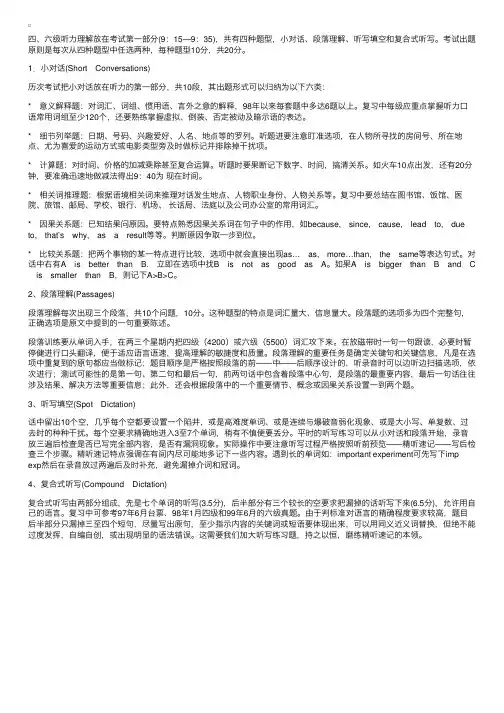
四、六级听⼒理解放在考试第⼀部分(9:15—9:35),共有四种题型,⼩对话、段落理解、听写填空和复合式听写。
考试出题原则是每次从四种题型中任选两种,每种题型10分,共20分。
1.⼩对话(Short Conversations) 历次考试把⼩对话放在听⼒的第⼀部分,共10段,其出题形式可以归纳为以下六类:* 意义解释题:对词汇、词组、惯⽤语、⾔外之意的解释,98年以来每套题中多达6题以上。
复习中每级应重点掌握听⼒⼝语常⽤词组⾄少120个,还要熟练掌握虚拟、倒装、否定被动及暗⽰语的表达。
* 细节列举题:⽇期、号码、兴趣爱好、⼈名、地点等的罗列。
听题进要注意盯准选项,在⼈物所寻找的房间号、所在地点、尤为喜爱的运动⽅式或电影类型旁及时做标记并排除掉⼲扰项。
* 计算题:对时间、价格的加减乘除甚⾄复合运算。
听题时要果断记下数字、时间,搞清关系。
如⽕车10点出发,还有20分钟,要准确迅速地做减法得出9:40为现在时间。
* 相关词推理题:根据语境相关词来推理对话发⽣地点、⼈物职业⾝份、⼈物关系等。
复习中要总结在图书馆、饭馆、医院、旅馆、邮局、学校、银⾏、机场、长话局、法庭以及公司办公室的常⽤词汇。
* 因果关系题:已知结果问原因。
要特点熟悉因果关系词在句⼦中的作⽤,如because, since, cause, lead to, due to, that’s why, as a result等等。
判断原因争取⼀步到位。
* ⽐较关系题:把两个事物的某⼀特点进⾏⽐较,选项中就会直接出现as… as, more…than, the same等表达句式。
对话中右有A is better than B. ⽴即在选项中找B is not as good as A。
如果A is bigger than B and C is smaller than B,则记下A>B>C。
2、段落理解(Passages) 段落理解每次出现三个段落,共10个问题,10分。
![大学英语等级训练与应试技巧 [大学四六级听写部分的应试技巧]](https://uimg.taocdn.com/8370428c0b1c59eef9c7b448.webp)
《大学英语等级训练与应试技巧 [大学四六级听写部分的应试技巧]》摘要:“复合式听写”能力和应试方法,这体裁具不主题突出条理分明层次清楚、语言简洁、逻辑性强特,出容要这样考生应重记下句心词全国“学英语四级统考97年6月首次采了“复合式听写”()这题型它比听力选择题更强调语言综合运用能力考生不仅要具有良听能力还应具有较强拼写能力记笔记能力和面表达能力听能力是“复合式听写”基础听写训练已有较多刊进行介绍和研究笔者打算结合己教学体会谈谈如何提高“复合式听写”能力和应试方法.通卷面捕捉信息出线、了“复合式听写”材多说明(x)这体裁具不主题突出条理分明层次清楚、语言简洁、逻辑性强特开头或段首多半有主题句()段、句进步具体扩展、说明或论证主题句根据“复合式听写”样题听写二部分二、三然段首和段尾有完整主题句考生应利用切机会如考前空隙或播放考试指令浏览试卷该项下部分尤其是主题句根据主题句预测发展线和考生不难推测所记要应是作客客人应带些什么礼品及所赠对象而不会涉及作客应穿什么样装或到、离主人等方面容这样便增强了考生对认知)熟悉感缩了容围考生听音更具针对性和准确性心理放松更信使己考试处主动地位即使“复合式听写”材其它体裁听音前浏览下试题也有裨益因具有致性和连贯性特从试题我们总会到些有参考价值材听写结合双管齐下根据“复合式听写”新题型通知说明遍是全朗要考生听懂全容由听音前考生已测览了卷面对听力材有了致了因听遍考生可以适当地填写些单词和做些笔记听主记辅要做“复合式听写”考生多多实践获取较强边听边记能力听音贯穿着期待、预知、分析、综合推理和判断等系列程考生应快速记下几关键词而记笔记又要能有效;专地听获取信息理全听写边听边记具有必要性听手段写目;听和记两种不语言技能‘复合式听写”有着紧密系相促进遍记下关键词有助二遍听写启发记忆提示要也减轻了二遍笔记任使笔记更加充实、完整依次与出容要才会更加全面、准确另方面边听边记也具有可行性试想学主听外籍教师上课听了遍不是也可记下授课要吗?只要多加练习其实也不难做到3.提高记笔记效率般考生听完两汤基可听懂句;但只凭记忆写要往往容易有疏漏和错误足够信息量笔记是写要重要条件;但如何有限记录下更多容呢?这里介绍几种方法首先可使用缩略语其次由“复合式听写”二部分朗没有停顿即使使甩缩略语也难记下全因考生应有选择地记笔记另外因“复合式听写”二部分只要写出容要这样考生应重记下句心词通这几种方法考生压缩了所记词语赢得了精练了容增了笔记信息量写容要创造了条件面表达容要“复合式听写”全朗两遍停顿五分钟让考生根据所听和所记容写出二部分主要思答题考生应针对以上容及部分和二部分主题句进行诊折、判断概括要显然不可缺漏但也无有闻必录多多益善考生应分清主次有所取爱从这义上说“复合式听写”还要考生具有定逻辑分析归纳能力表达应简洁、通顺、准确分析样题参考答案我们不难发现它有以下特()将容要分列几清楚明白目了然()要尽可能用完整简单句表达不宜用短语句式也不宜复杂(3)尽量省语句可有可无修饰成份总而言考生应用有限词语简洁明了地概括出所听容全部要使容要和语言表达达到有机完美统5.检、核对容要“复合式听写”三遍朗供考生进行核对核对是必不可少环节考生应抓住机弥补前两遍听音所忽略或遗漏容进步修改和完善己答案听写部分要考生填人所缺单词有考生只凭辩音仍难以准确地判断出应何词考生可运用己语言知识修正听力细节上不足主要可以从语法结构词语搭配、义连贯、上下等多角推测分析和判断;并正确拼写出单词而核对听写二部分容要表达、则应力要完整、准确尽量减少语言语法、拼写等错误。
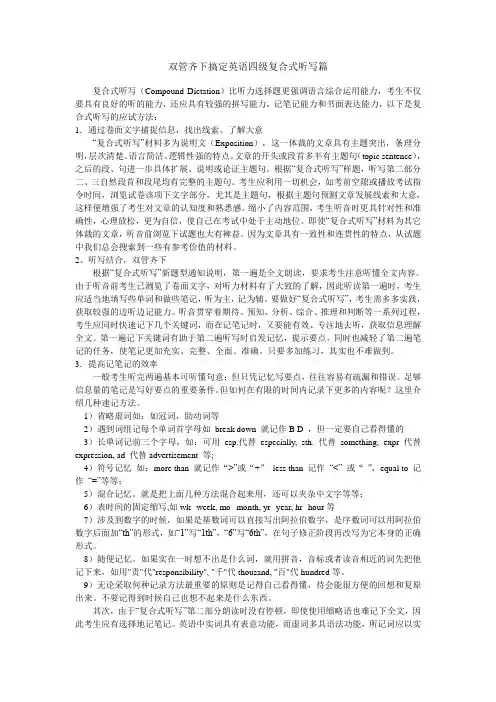
双管齐下搞定英语四级复合式听写篇复合式听写(Compound Dictation)比听力选择题更强调语言综合运用能力,考生不仅要具有良好的听的能力,还应具有较强的拼写能力,记笔记能力和书面表达能力,以下是复合式听写的应试方法:1.通过卷面文字捕捉信息,找出线索、了解大意“复合式听写”材料多为说明文(Exposition),这一体裁的文章具有主题突出,条理分明,层次清楚、语言简洁、逻辑性强的特点。
文章的开头或段首多半有主题句(topic sentence),之后的段、句进一步具体扩展、说明或论证主题句。
根据“复合式听写”样题,听写第二部分二、三自然段首和段尾均有完整的主题句。
考生应利用一切机会,如考前空隙或播放考试指令时间,浏览试卷该项下文字部分,尤其是主题句,根据主题句预测文章发展线索和大意,这样便增强了考生对文章的认知度和熟悉感。
缩小了内容范围,考生听音时更具针对性和准确性,心理放松,更为自信,使自己在考试中处于主动地位。
即使“复合式听写”材料为其它体裁的文章,听音前浏览下试题也大有裨益。
因为文章具有一致性和连贯性的特点,从试题中我们总会搜索到一些有参考价值的材料。
2、听写结合,双管齐下根据“复合式听写”新题型通知说明,第一遍是全文朗读,要求考生注意听懂全文内容。
由于听音前考生已测览了卷面文字,对听力材料有了大致的了解,因此听读第一遍时,考生应适当地填写些单词和做些笔记,听为主,记为辅。
要做好“复合式听写”,考生需多多实践,获取较强的边听边记能力。
听音贯穿着期待、预知、分析、综合、推理和判断等一系列过程,考生应同时快速记下几个关键词,而在记笔记时,又要能有效、专注地去听,获取信息理解全文。
第一遍记下关键词有助于第二遍听写时启发记忆,提示要点,同时也减轻了第二遍笔记的任务,使笔记更加充实、完整、全面、准确。
只要多加练习,其实也不难做到。
3.提高记笔记的效率一般考生听完两遍基本可听懂句意;但只凭记忆写要点,往往容易有疏漏和错误。
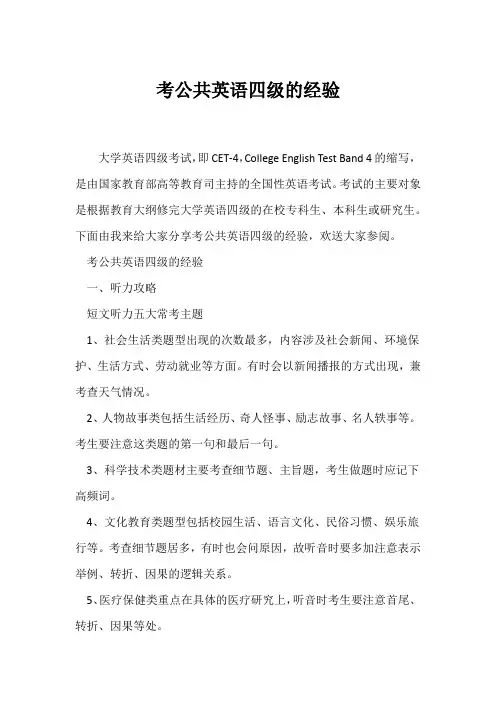
考公共英语四级的经验大学英语四级考试,即CET-4,College English Test Band 4的缩写,是由国家教育部高等教育司主持的全国性英语考试。
考试的主要对象是根据教育大纲修完大学英语四级的在校专科生、本科生或研究生。
下面由我来给大家分享考公共英语四级的经验,欢送大家参阅。
考公共英语四级的经验一、听力攻略短文听力五大常考主题1、社会生活类题型出现的次数最多,内容涉及社会新闻、环境保护、生活方式、劳动就业等方面。
有时会以新闻播报的方式出现,兼考查天气情况。
2、人物故事类包括生活经历、奇人怪事、励志故事、名人轶事等。
考生要注意这类题的第一句和最后一句。
3、科学技术类题材主要考查细节题、主旨题,考生做题时应记下高频词。
4、文化教育类题型包括校园生活、语言文化、民俗习惯、娱乐旅行等。
考查细节题居多,有时也会问原因,故听音时要多加注意表示举例、转折、因果的逻辑关系。
5、医疗保健类重点在具体的医疗研究上,听音时考生要注意首尾、转折、因果等处。
复合式听写:关键词“预测〞技巧技巧一:根据空白处的语法形式预测答案在复合式听写中,填单词采用的是完形填空的形式,每个空格都处于特定的上下文之中。
因此,考生可以根据空格在句中的位置判断所填单词的词性。
由历年真题来看,六级听写的单词局部名词和动词占所需填写单词中的5-6个,副词和形容词一般在1-3个,短语占到2-3个。
技巧二:根据并列连词或并列关系预测答案在预读听写短文时,考生常常会看到but,and,as well as这类并列连词。
这些标志性的连词可以暗示所填词的词性及意思。
技巧三:根据固定搭配预测答案英语的表达中有许多固定搭配,出题人有时会在固定搭配的短语上挖空,考生平时要多积累常用的固定表达,以不变应万变。
二、阅读攻略长篇阅读做题技巧:1. 快速阅读文章标题、首尾两段,了解主题;2. 通读10道题目,划出关键词;3. 带着关键词浏览文章,寻找与所划关键词一致或同义的词句。
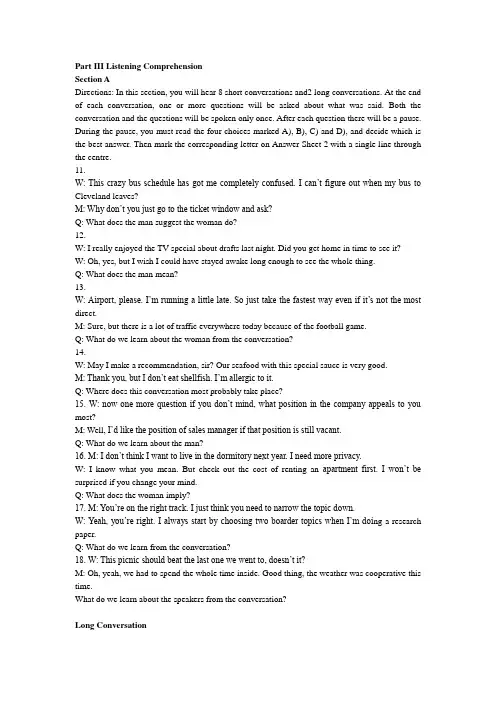
Part III Listening ComprehensionSection ADirections: In this section, you will hear 8 short conversations and2 long conversations. At the end of each conversation, one or more questions will be asked about what was said. Both the conversation and the questions will be spoken only once. After each question there will be a pause. During the pause, you must read the four choices marked A), B), C) and D), and decide which is the best answer. Then mark the corresponding letter on Answer Sheet 2 with a single line through the centre.11.W: This crazy bus schedule has got me completely confused. I can’t figure out when my bus to Cleveland leaves?M: Why don’t you just go to the ticket window and ask?Q: What does the man suggest the woman do?12.W: I really enjoyed the TV special about drafts last night. Did you get home in time to see it? W: Oh, yes, but I wish I could have stayed awake long enough to see the whole thing.Q: What does the man mean?13.W: Airport, please. I’m running a little late. So just take the fastest way even if it’s not the most direct.M: Sure, but there is a lot of traffic everywhere today because of the football game.Q: What do we learn about the woman from the conversation?14.W: May I make a recommendation, sir? Our seafood with this special sauce is very good.M: Thank you, but I don’t eat shellfish. I’m allergic to it.Q: Where does this conversation most probably take place?15. W: now one more question if you don’t mind, what position in the company appeals to you most?M: Well, I’d like the position of sales manager if that position is still vacant.Q: What do we learn about the man?16. M: I don’t think I want to live in the dormitory next year. I need more privacy.W: I know what you mean. But check out the cost of renting an apartment first. I won’t be surprised if you change your mind.Q: What does the woman imply?17. M: You’re on the right track. I just think you need to narrow the topic down.W: Yeah, you’re right. I always start by choosing two boarder topics when I’m doi ng a research paper.Q: What do we learn from the conversation?18. W: This picnic should beat the last one we went to, doesn’t it?M: Oh, yeah, we had to spend the whole time inside. Good thing, the weather was cooperative this time.What do we learn about the speakers from the conversation?Long ConversationConversation OneM: When I say I live in Sweden, people always want to know about the seasons.W: The seasons?M: Yeah, you know how cold it is in winter? What is it like when the days are so short?W: So what is it like?M: Well, it is cold ,very cold in winter. Sometimes it is cold as 26 degrees below centigrade. And of course when you go out, you’ll wrap up warm. But inside in the houses it’s always very warm, much warmer than at home. Swedish people always complain that when they visit England, the houses are cold even in the good winter.W: And what about the darkness?M: Well, yeah, around Christmas time there’s only one hour of daylight, so you really looks forward to the spring. It is sometimes a bit depressing. But you see the summers are amazing, from May to July in the North of Sweden the sun never sets. It’s still light in the midnight. You can walk in the mountains and read a newspaper.W: Oh, yeah, the land of the midnight sun.M: Yeah, th at’s right, but it’s wonderful. You won’t stay up all night. And the Swedes makes most of it often they started work earlier in summer and then leave at about 2 or 3 in the afternoon, so that they can really enjoy the long summer evenings. They’d like to w ork hard, but play hard, too.I think Londoners work longer hours, but I’m not sure this is a good thing.Q19: What do we learn about the man from the conversation?Q20: What do Swedish people complain about when they visit England in winter?Q21: How does the man describe the short hour of daylight around Christmas in Sweden?Q21: What does the man say about the Swedish people?Conversation TwoW: What kind of training does one need to go into this type of job?M: That’s a very good question. I don’t th ink there is any, specifically.W: For example, in your case, what was your educational background?M: Well, I did a degree in French at Nottingham. After that, I did careers work in secondary schools like the careers guidance people. Here is in the university. Then I went into local government because I found I was more interested in the administrative side. Then progressed on to universities. So there wasn’t any plan and there was no specific training. There are plenty of training courses in management techniques and committee work which you can attend now.W: But in the first place, you did a French degree.M: In my time, there wasn’t a degree you could do for administration. I think most of the administrators I’ve come across have degrees and all sorts o f things.W: Well, I know in my case, I did an English literature degree and I didn’t really expect to end up doing what I am doing now.M: Quite.W: But you are local to Nottingham, actually? Is there any reason why you went to Nottingham University?M: No, no, I come from the north of England, from west Yorkshire. Nottingham was one of theuniversities I put on my list. And I like the look of it. The campus is just beautiful.W: Yes, indeed. Let’s see. Were you from the industrial part of Yorkshire?M: Yes, from the Woolen District.Q23. What was the man’s major at university?Q24: What was the man’s job in secondary schools?Q25: What attracted the man to Nottingham University?Section BPassage OneWhile Gail Obcamp, an American artist was giving a speech on the art of Japanese brush painting to an audience that included visitors from Japan, she was confused to see that many of her Japanese listeners have their eyes closed. Were they tuned off because an American had the nerve to instruct Japanese in their own art form or they deliberately tried to signal their rejection of her? Obcamp later found out that her listeners were not being disrespectful. Japanese listeners sometimes closed their eyes to enhance concentration. Her listeners were showing their respect for her by chewing on her words. Some day you may be either a speaker or a listener in a situation involving people from other countries or members of minority group in North America. Learning how different cultures signal respect can help you avoid misunderstandings. Here are some examples. In the deaf culture of North America, many listeners show applause not by clapping their hands but by waving them in the air. In some cultures, both overseas and in some minority groups in North America, listeners are considered disrespectful if they look directly at the speaker. Respect is shown by looking in the general direction but avoiding direct eye contact. In some countries, whistling by listeners is a sign of approval while in other courtiers it is a form of insult.Questions:26, What did Obcamp’s speech focus on?27, Why do Japanese listeners sometimes close their eyes while listening to a speech?28, What does the speaker try to explain?Passage TwoChris is in charge of purchasing and maintaining equipment in his Division at Taxlong Company. He is soon going to have an evaluation interview with his supervisor and the personnel director to discuss the work he has done in the past year. Salary, promotion and plans for the coming year will also be discussed at the meeting. Chris has made several changes for his Division in the past year. First, he bought new equipment for one of the departments. He has been particularly happy about the new equipment because many of the employees have told him how much it has helped them. Along with improving the equipment, Chris began a program to train employees to use equipment better and do simple maintenance themselves. The training saved time for the employees and money for the company. Unfortunately, one serious problem developed during the year. Two employees the Chris hired were stealing, and he had to fire them. Chris knows that a new job for apurchasing and maintenance manager for the whole company will be open in a few months, and he would like to be promoted to the job. Chris knows, however, that someone else wants that new job, too. Kim is in charge of purchasing and maintenance in another Division of the company. She has also made several changes over the year. Chris knows that his boss likes Kim’s work, a nd he expects that his work will be compared with hers.Questions 29 to 32 are based on the passage you have just heard.29. What is Chris’s main responsibility at Taxlong Company?30. What problem did Chris encounter in his Division?31. What does Chris hope for in the near future?32. What do we learn about Kim from the passage?Passage ThreeProverbs, sometimes called sayings, are examples of folk wisdom. They are little lessons which older people of a culture pass down to the younger people to teach them about life. Many proverbs remind people of the values that are important in the culture. Values teach people how to act, what is right, and what is wrong. Because the values of each culture are different, understanding the values of another culture helps explain how people think and act. Understanding your own culture values is important too. If you can accept that people from other cultures act according to their values, not yours, getting along with them will be much easier. Many proverbs are very old. So some of the values they teach may not be as important in the culture as they once were. For example, Americans today do not pay much attention to the proverb “Haste makes waste”, because patience is not important to them. But if you know about past values, it helps you to understand the present and many of the older values are still strong today. Benjamin Franklin, a famous American diplomat, writer and scientist, died in 1790, but his proverb “Time is money” is taken more seriously by Americans of today than ever before. A study of proverbs from around the world shows that some values are shared by many cultures. In many cases though, the same idea is expressed differently.Questions 33- 35 are based on the passage you have just heard.33. Why are proverbs so important?34. According to the speaker what happens to some proverbs with the passage of time?35 What do we learn from the study of proverbs from around the world?Section CCompound Dictation复合式听写原文:Our lives are woven together. As much as I enjoy my own company, I no longer imagine I can get through a single day much less or my life completely on my own. Even if I am on vacation in the mountains, I’m eating food someone else has grown, living in a house someone else has built,wearing clothes someone else has sewn from cloth woven by others, using electricity someone else is distributing to my house. Evidence of interdependence is everywhere. We are on this journey together. As I was growing up, I remember being carefully taught that independence not interdependence was everything. Make your own way, stand on your own two feet, or my mother’s favorite remark when I was face to face with consequences of some action, ‘now that you’ve made your bed, lie on it’. Total independence is a dominant theme in our culture. I imagine that what my parents were trying to teach me was to take responsibility for my actions and my choices. But the teaching was shaped by our cultural images. And instead I grew up believing that I was supposed to be totally independent, and consequently became very reluctant to ask for help.I would do almost anything not to be a burden and not require any help from anybody。

四六级考试技巧及方法有哪些整理四六级考试技巧及方法有哪些在高校当中,英语四六级考试是特别重要的两次考试。
对于英语基础好的同学,可能四六级都是一次过,但是对于基础一般的同学来说,四六级考试就需要多用几次次数了。
一起学习四六级考试技巧及方法吧。
四六级考试技巧及方法听力众所周知听力占了整张试卷大部分的分值,那么我们应当怎么做呢?①相关保留选择:当两个选项含有相同的词时,再看其他选项,若其他选项与那两个相同词其中一个相关,则可排解。
①异项保留原则:当选项中消失有意思明显相反的两项时,那么正确答案必定在这两张内,假如消失双重异项,则可选出答案。
①女士保留原则:当对话中消失女士的建议和要求时,我们肯定要留意,这时女士说出来的话很有可能就是答案,由于在英语考试中,女士一般以女神的形象出面,一般为正确选项。
①概括、抽象保留原则:当选项中消失比较概括,抽象的句子时,这时我们就要把表述事实的详细的句子划掉,而选择表概括,抽象,比较性的句子!此选择可衍生出一个包含取大的原则。
①态度、虚拟保留原则:这两种方法一般无单独命题的规律性,只是当做上述的四种方法帮助,当剩下两个选项时,通常正态度的选项简单是正确答案。
专项练习泛听:找一些历年的真题听力,带上耳机,多听。
也可以多听一些英文歌或者看一些美剧,这有利于培育英语的耳感。
精听:找一些两三分钟的听力材料,然后先泛听一两遍,然后进行第三遍的时候,边听边写下所听到的内容。
精听需要急躁,所以想进步还得下苦功夫哟!Two选词填空选词填空占分值较低,建议后边有时间再做。
①预览选项,了解词义并把选项分为四大类词性:名词n,动词v,形容词adj,副词adv,在每个选项后面做好词性标记。
①精读全文开头,把握文章主题,并以三个空为一个段落或一个段落为一个单位,利用前后文推断每空的词性。
①把对应词性的选项逐一带回原文,词意通顺,时态、主谓搭配全都即为正确选项。
专项练习选词填空相当于考你的词汇量,所以日常多积累单词。
四六级听力的题型听力考试是四六级考试中非常重要且考查难度较大的一部分,对于备考的同学来说,了解各种听力题型的特点以及解题技巧非常重要。
本文将介绍四六级听力中常见的题型及解题策略,帮助大家更好地备考。
一、单选题在单选题中,听力材料往往包含一问一答或者简短的对话。
考生需要根据听到的内容选择最合适的答案。
解题时,首先要仔细聆听问题的内容,了解问题的要求,然后聚焦关键词,尤其是时间、地点、人物等关键信息。
在听力过程中要积极笔记,记下重要信息,最后结合选项进行答题。
二、多选题多选题通常是对话或者短文,考生需要根据听到的内容选择最恰当的答案。
解题策略与单选题类似,关键在于聚焦关键词并做好笔记。
同时,要注意选项之间的区别和转折关系,以避免误选。
三、判断题判断题通常是对话、短文或者新闻报道。
考生需要听到的内容进行判断,判断选项为“对”或“错”。
解题时,要注意关注关键细节和逻辑关系,切记不要被听力材料的表面现象所迷惑。
四、填空题填空题是指听到有关细节或者问题的内容,需要将听到的信息填入空格中。
解题时,要注意抓关键词和逻辑关系,要快速判断空格前后的信息,填写合适的单词或短语。
五、听写题听写题是指对一段话或句子进行听写,考生需要完全正确地听写出所听内容,包括语法、语义和标点符号。
解题时,要注意抓住关键词,提高对于英语语音的辨析能力。
六、长对话或讲座题长对话或讲座题通常是一段较长的对话或者讲座,要求考生根据听到的内容回答问题。
解题时,要预测问题的答案范围和关键信息,有针对性地聚焦听力材料。
七、复合式听写题复合式听写题是四六级听力考试中较难的一种题型,选择一段对话或讲座,考生需要在听力材料播放完毕后,将听到的内容填写在答题纸上。
解题时,要注意抓关键词、提高对英语语音的辨析能力,同时要注意听力材料的逻辑关系。
八、逻辑填空题逻辑填空题是四级听力考试中较难的一种题型,要求考生根据所听材料填写空白处的单词或短语。
解题时,要注意整体把握和逻辑关系,同时注意单词形态和句子结构的搭配。
英语四级答题方法技巧高校英语四级考试对高校生来说是很重要的一次考试,答题不仅要求专业到位,一些答题技巧也是必不行少的。
下面是我为大家整理的关于英语四级答题方法技巧,盼望对您有所关心!英语四级答题小技巧一、四级阅读四级速读:一看二查三圈点。
一看,看题干关键词!找特别名词或词组。
二查,查阅关键词对应句。
当句子失效时查段落首末句,尤其是末句!20_年6月七道选择题五道答案在末句!三圈点,圈点句中动词和名词!正确答案的特点,是核心动词和名词与原句完全全都或至少词义接近。
四级精读:①先看题(what,why,to,view)②划题干独特信息回原文找出处,特殊关注:因果并列比较转折结论建议性表达③用原文信息对比选项信息,对原文做精确改写,形式对应(并列对并列,比较对比较)含义对应(同义替换词)的选项最优选.记背历年真题正确选项与原文的同义替换词是捷径!四级选词填空:①选项分词性n.v.a.ad.②依据每空前后信息推断词性③把对应词性选项逐一带回原文,含义通顺,时态主谓搭配全都者为正确答案.历年真题中选词填空/完形填空/态度题的选项复合式听写的单词都可能成为下次的`备选选项.考试中把选词填空放到最终做,充裕时间留给精读.二、四级听力四级短对话:1、看题时关注谓语宾语表语(动词形容为先)并勾划;2、对立或相像选项保留;3、急速预备校内餐厅酒店等必考场景;4、听其次句、听语气态度转折动作;5、包含同义替换词语的选项胜利系数最大;6、救命原则:视听反向,听到的不选。
四级长对话:关注男女两人语气,把握大方向;七道题中,试听全都原则可以解答出四道题目左右;对话的替换法比较简洁,一般是词性替换(popular-populairty)和简洁词义替换(be fed up with - be tired of ):较短选项的题目利用重复法,亦即读最多遍的选项为正确答案。
四级短文听力:四级短文听力:1纵向扫选项,划出不一样的谓语宾语表语部分;2挨次出题,绝大部分题听到什么选什么,少数同义替换解题;3疑问语气和因果转折关系词(because,but,etc)后极易出考点;4边听边做!不等问题!四级复合式听写:1预看题时筛出已给段落高频词,极易在后三个句子中消失2预判前八空中可能填名词和动词的题,稍后重点关注其单复数或时态3三个句子听到什么写什么,首尾部分最易写出,抄写时尽量修改补全使之成为完整句子4针对复合式听写的优先单词储备三、四级完形完形填空:四六级通用!1严峻做好近三年真题;2先看各段首句把握重复信息,了解主旨;3挑题做:按介词、连词、并列连词旁边、和历史重现考题挨次来做;4检查段首句和文章中重复信息!最终,争取把近三年考过的生词背下来!就是背答案!四、四级写作和翻译写作:_年6月四级写作关注对立观点分析型。
四六级考试真题试卷一、听力部分(共30分)1. 短对话理解(每题1分,共8分)请听下面8段对话,每段对话后有一个问题,从A、B、C三个选项中选择最佳答案。
[对话1]M: Hey, do you have any plans for the weekend?F: Yes, I'm going to the library to study for my exam.Q: What is the woman going to do this weekend?A) Go to the beach.B) Study at the library.C) Watch a movie.[对话2]...[对话8]2. 长对话理解(每题2分,共8分)请听下面2段长对话,每段对话后有2个问题,从A、B、C三个选项中选择最佳答案。
[长对话1]...Q1: What is the main topic of the conversation?A) Travel plans.B) Job interviews.C) Academic research.Q2: Why does the man sound upset?A) He missed the bus.B) He lost his wallet.C) He failed the exam.[长对话2]...3. 短文理解(每题2分,共7分)请听下面3段短文,每段短文后有一个问题,从A、B、C三个选项中选择最佳答案。
[短文1]...Q: What is the speaker mainly talking about?A) The history of the city.B) The development of technology.C) The importance of education.[短文2]...4. 复合式听写(共7分)请听一段短文,根据所听内容填写下面的信息。
英语四六级题型对比一、听力部分对比1.四级听力:包括长对话、短文听力、单词和词组听写、复合式听写四部分,总分值为248.5分,占总分值的30%。
2.六级听力:包括长对话、短文听力、听力篇章和听写四部分,总分值为248.5分,占总分值的30%。
二、阅读理解部分对比1.四级阅读理解:包括词汇理解、长篇阅读和仔细阅读三部分,总分值为248.5分,占总分值的35%。
2.六级阅读理解:包括词汇理解、长篇阅读和仔细阅读三部分,总分值为248.5分,占总分值的35%。
三、翻译部分对比1.四级翻译:为汉译英段落翻译,总分为106.5分,占总分值的15%。
2.六级翻译:为汉译英段落翻译,总分为106.5分,占总分值的15%。
四、写作部分对比1.四级写作:包括应用文和短文写作两部分,总分为106.5分,占总分值的15%。
2.六级写作:包括应用文和短文写作两部分,总分为106.5分,占总分值的15%。
五、总分值与考试时间对比1.四级总分为710分,考试时间为120分钟。
2.六级总分为710分,考试时间为130分钟。
六、考试难度与通过率对比1.四级难度适中,通过率较高。
2.六级难度较大,通过率相对较低。
七、考察重点与范围对比1.四级考察重点在于基础词汇和语法知识的掌握和应用能力。
2.六级考察重点在于较高层次词汇和语法知识的掌握和应用能力,同时更注重对语篇分析和综合运用能力的考查。
总体来说,四级和六级在题型上较为相似,但难度和考察重点有所不同。
考生在备考过程中需要根据自己的实际情况选择合适的考试级别,并注重基础知识的巩固和语篇分析能力的提升。
英语四级听力篇之复合式听写大学英语四级中的 “复合式听写”(Compound Dictation )这一题型,它比听力选择题更强调语言综合运用能力,听力选择题更强调语言综合运用能力,考生不仅要具有良好的听的能力,考生不仅要具有良好的听的能力,考生不仅要具有良好的听的能力,还应具还应具有较强的拼写能力,记笔记能力和书面表达能力餐厅 日程表 同事所有四级真题听力部分的原文和选项部分的词汇全部背会。
要求听懂且能够准确拼写。
四级复合式听写占全卷10%,共11题。
前8题需要考生听写出8个单词,每词占0.5%。
后三题需要考生听写出句子,每句得分2%。
其中单词部分必须听到什么写什么,很可能会涉及被动语态、时态、单复数等语法。
句子部分有两种做法,考试规定,可以听到什么写什么,也可以用自己的总结语言写要点。
听写共播读三遍,第一遍和第三遍匀速,第二遍时,句子部分播读完毕会停顿1分钟左右。
1、 评分原则要求考生将听到的单词正确写出;要求考生将听到的单词正确写出;将听到的原文句子正确写出,将听到的原文句子正确写出,将听到的原文句子正确写出,或用自己的语言或用自己的语言正确写出。
2、 评分标准1) S1至S7每题0.5分,答案如上所示。
如拼写单词有误,则不给分。
2) S8题满分2.5分;S9和S10题满分各为2分。
3) S8至S10题中的语言错误无论多与少,题中的语言错误无论多与少,每题只扣每题只扣0.5分;写出与问题无关的内容扣0.5分;用汉语答题不给分。
3、 其他正确答案举例以S8题为例,下列回答均可得满分。
1) seven bad men jumped out. One man had a knife and we got into a flight. 2) Seven bad men jumped at me, one of them had a knife and we got into a flight. 3) Seven bad men jumped out and fought with me, one of them had a knife. 4) Seven bad men threatened me with a knife and we got into a flight. 2、 如何边听边写? 2-1 缩写法。
最牛英语口语培训模式:躺在家里练口语,全程外教一对一,三个月畅谈无阻!
洛基英语,免费体验全部在线一对一课程:/ielts/xd.html(报名网址)Compound Dictation is a very difficult item of listening test. It includes two parts: word dictation and sentence reproduction. The first seven (usually seven) blanks require your accurate spelling of the words you hear. The last three blanks call for reproductions of sentences. Original sentences would be acceptable.
Four ability tested:
Listening ability: clearly get the information said
Memorizing ability: memorize the information for a time to finish all the exercises
Comprehension ability: understand the information; extract your own meaning from it
Expression ability: write out your own understanding of the information in correct and good English as well as correct spelling.
Pre-listening: Take advantage of the time when the direction is spoken to read the passage quickly to get its main idea and structure. Make wild guess what word could be used in the first 7 blanks, and what is expected to be talked about in the last three blanks. The more you can guess, the better.
While listening:
“Now listen to the passage:”Write one or two letters for the first seven blanks. Remember not to write the complete spelling of the words, which will make you stay here and miss the latter part of the passage. For the last three sentences, do not write anything but close your eyes and listen carefully, try to translate what you heard into Chinese for better understanding and memorization. Pay special attention to the sentence structure (therefore, while, however, who, etc.). The sentences tested are usually parallel sentences and compound sentences.
“Now the passage will be read again:”Complete the first seven blanks quickly, and get well-prepared for the last three blanks. Try to write some key words, important words, structural words of the sentences (Subject, verb, object, and conjunction). Do not try to write every word. Some insignificant words can be made up later very easily.
“Now the passage will be read for a third time:”Check the first 7 words and complete the last three sentences.
一.复合式的两大前提:
1、熟练的句子填空及拼写能力
2、准确的单词认知及其拼写
typical relatively describe variety architecture
artificial despite / regardless of be focused on
emotionally rational retirement preventive (health)
transmit ruin species equal current equipment
mysterious average investigate similarly additional
vital
二.复合式的四个考察点:
1、语音辨析能力
2、拼写能力
3、速记能力
4、逻辑分析和归纳能力
三.复合式的四大语音现象:
1、连读
think it over look at each other check it over went inside sell it
2、失去爆破弱化爆破
bad taste wanted to started to decided to next door/next store
Postcard midnight
3、爆破音连读
seven sleepless sleepers seek sleep
a big black bug beat a big black bear make the black bear bleed blood
4、缩略音
you’ll you’ve you’d
四.五大句型速记
1、because 因果
2、but 转折
3、than 比较句
4、that 让步从句
5、and 并列句
记句子主干单词的前两三个字母,主干单词具有不可替代性,包括主语,动词,名词实词,有选择的记笔记。
英语中的实词具有表意功能,而虚词多具语法功能,所以记词应以实词为主。
五.复合式理想状态四步走:
听前第一步:通过卷面文字捕捉信息,找出线索,了解大意,猜测填空内容,判断词性及句意
录音第一遍:听懂文章的大致意思,记录下单词的第一个字母,并记录下句子的主干(主谓宾)
录音第二遍:完整记录下前7个单词,进一步补充句子的主干
录音第三遍:全面整合填空内容,将单词句子补充完整
六.全面检查五步走:
1、多词漏词(句子的完整性)
2、单词拼写错误(句子的准确性)
modern opportunity ordinary environment calendar
disappointed successful correct necessarily
3、句首字母大写(句子格式的正确)
4、动词时态(句子时态正确)
come begin give become transmit
5、名词单复数(句子语法正确)
“成千上万人疯狂下载。
更多价值连城的绝密英语学习资料,洛基内部秘密英语,技巧,策略
请在网上申请报名”。